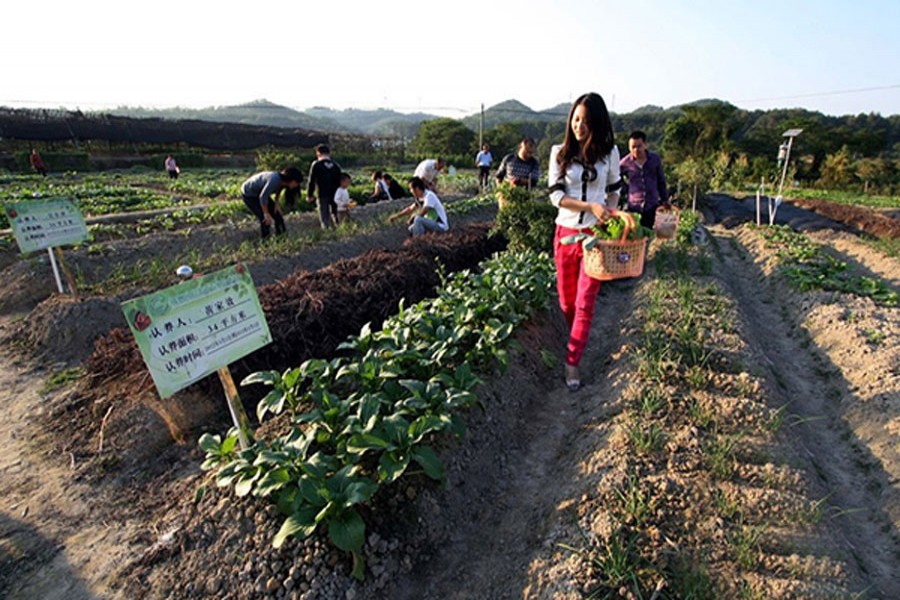Rural tourism brings fortunes for China’s less-fortunate ones
Banishing poverty by 2020 CPC centenary looks to be a dream come true

Published :
Updated :

Rural or agriculture tourism has emerged as China's most effective weapon to fight out poverty by the target-year 2020, helping myriad people out of the vicious circle of misfortune.
Not only is it improving financial strengths of the lower-income groups but also playing a key role in stopping migration of workers by way of expanding working opportunities in the backwoods, officials said.
The hospitality-service sector, at the same time, is contributing to bridging regional development gaps between the developed eastern and the least- developed western provinces or regions.
The Government of China, led by President Xi Jingpin, shone utmost focus on a special concept to bring further speed in the country's ongoing poverty-alleviation campaign since 2013 for achieving the government's target of eliminating poverty by 2020 when the ruling Communist Party of China (CPC) will celebrate its centenary (100 years of founding).
Rural or agriculture tourism is basically a sustainable anti-poverty package involving five key things.
Firstly, it reshapes economy of the locality by taking care of the most potential economic areas like crop production, fishing, vegetable cultivation, flower farming.
Secondly, this trade helps in building affordable houses with basic facilities like sanitation, supply of pure drinking water for the locals.
Thirdly, it builds up social security and welfare that includes pension, medical insurance, commercial insurance and subsistence.
Fourth, it provides required finances from the banking system.
And lastly, necessary infrastructures like roads connecting each household with the mainstream market economy are being built.
The economic-innovation initiative also facilitates the villagers to form cooperative-driven cultivation practices to reap decent profits by joining hands.
Jinggangshan, the heartland to CPC's first rural revolutionary base in east China's Jiangxi Province, is one of the first cities in China totally taken off the list of impoverished areas by applying such strategy.
The county's poor population stood down at 16,934 in 2014. That figure has fallen to zero today.
Zuo Xiufa's family lives in Shenshan Village, Mao-ping Township in Jinggangshan. Until early 2015, he had lived in a shanty or one of rundown houses there along with his nine-member family, with very little earning through land farming which was far below the standard of decent living. His earning has gone up manifold in less than one and a half years thanks to application of the concept of rural tourism for poverty alleviation.
Explaining recent socioeconomic leap of the family, the 67-year-old Zuo Xiufa said besides crop farming he had to go to the mountain to cut bamboo to meet necessary expenses of his family. But, under the targeted poverty-alleviation strategy, his house was renovated and other infrastructures like roads and sanitary arrangements were ensured by the county government.
He said he got interest-free finance worth ¥50,000 (¥1.0=Tk 12.75 ) from the banking sources and set up restaurants for the tourists, bamboo-processing store, began marketing handicraft products and rice cake that ensure decent earning for his family.
"I also get profit share of the earnings by the cooperative which took my land on rent. Chinese President Xi Jinping last year visited my house to inquire about our livelihood. It really changes our fortunes," he tells the success story of his own and of the socialist state's anti-poverty drive.
Peng Xiaying is a mother of three children living in the same Maoping Township whose annual earnings rose to ¥ 60,000 in 2016 from only ¥9,000 a year before. Her income comes from housing rent, restaurant, selling local tea, rice cake, animal husbandry and other sources.
"My elder son had worked in a laundry shop in another city due to poverty and recently came back to run the restaurant here, and we're planning to build lodging facility for an increased number of tourists," she said.
According to Jinggangshan's government office, households having per-capita income beyond ¥3300 are under the poverty line but the average per-capita income of the village rose to ¥12,000.
Like Jinggangshan, rural tourism is now helping millions of poor coming out of the poverty all over China-world's most populous country with a population of around 1.38 billion.
According to the official data, China managed to annually lift 6.7 million people out of poverty from 1990 to 2000 to be followed by 7-plus million in the subsequent decade.
But over the last five years (from 2012 to 2016) the country made remarkable achievement on poverty-eradication front by annually lifting over 13 million people out of poverty. If the country maintains the trend, they will be able to almost lift up the remaining 43 million poor by the deadline.
Hailing importance and achievement of such initiative, Chinese Premier Li Keqiang, while speaking at the First World Conference on Tourism Development in May 2016, said his country planned to lift 12 million people out of poverty in the next five years (2016-2020) through tourism development and strengthening international tourism cooperation.
He had also said most of China's impoverished people live in poor and remote areas, which face difficulties in developing agriculture and industry, but have unique advantages for developing tourism. Many remote and poor areas have already reduced poverty through tourism development.
According to the statistics from China National Tourism Administration, China will reduce the poverty-stricken population by 12 to 14 million in five years from 2016 through facilitating tourism development. The population that will rise out of poverty via tourism growth will account for 17 to 20 per cent of the national total of poverty-stricken people.
Its data also state that 70 per cent of urban tourists choose rural tourist destinations during China's three "golden-week" peak travel seasons in May, October and Spring Festival or China's Lunar New Year. Over 60 million tourists flock to rural tourist spots every such week.
jubairfe1980@gmail.com


 For all latest news, follow The Financial Express Google News channel.
For all latest news, follow The Financial Express Google News channel.